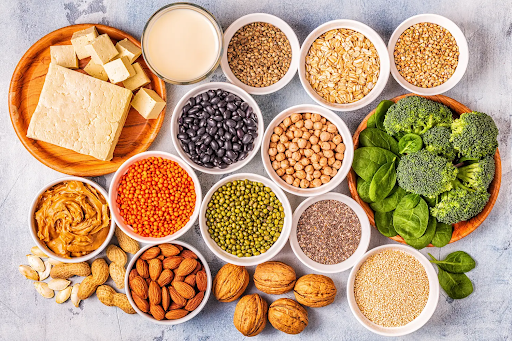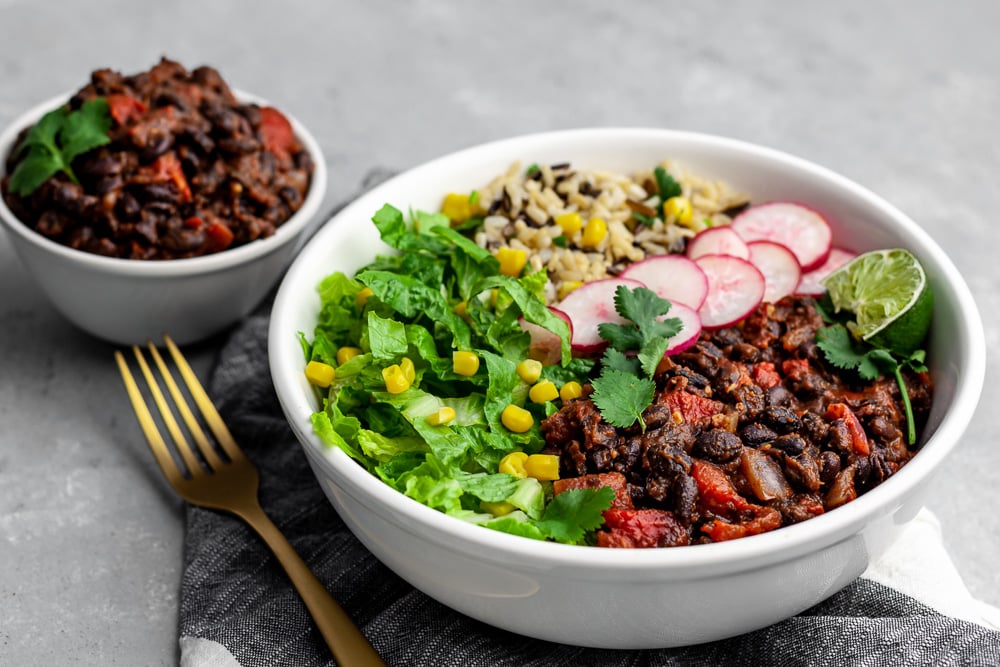How Gluten Free BBQ Sauce Elevates Your Vegan Grilling Game
Wiki Article
All Concerning Healthy And Balanced Food: Advantages of Checking Out Plant Based Alternatives
The conversation bordering plant-based diet regimens has actually gotten considerable interest recently. Numerous individuals are exploring the potential health advantages, dietary benefits, and environmental impacts connected with these dietary choices. As individuals come to be a lot more conscious of their food's influence on well-being and sustainability, inquiries develop regarding the functionalities of adopting such a way of living. What details modifications can one expect, and how might these selections reshape not only individual health and wellness but also the earth's future?Comprehending Plant-Based Diets
Although lots of people associate plant-based diet regimens generally with vegetarianism or veganism, these diets can incorporate a large range of eating patterns that prioritize whole, minimally processed plant foods. Such diet regimens commonly include fruits, veggies, whole grains, beans, nuts, and seeds, while getting rid of or restricting animal items. This flexibility enables people to tailor their nutritional choices according to dietary needs and personal choices. Some may embrace a largely plant-based diet while still sometimes consuming meat or milk, typically described as a flexitarian approach. The emphasis stays on including even more plant foods, which can result in a varied selection of tastes and meals. Comprehending these different interpretations of plant-based consuming is essential for valuing its ease of access and appeal in modern food society.Wellness Perks of Plant-Based Foods
The wellness benefits of plant-based foods are considerable, using a nutrient thickness benefit that supports total wellness. Study indicates that these foods can boost heart wellness and play an important role in effective weight management. By integrating extra plant-based options, people may boost their nutritional choices and promote lasting wellness.Nutrient Thickness Benefit
Nutrient thickness plays a necessary function in the health and wellness advantages of plant-based foods, making them a compelling selection for those looking for a well balanced diet plan. Plant-based foods, such as fruits, vegetables, beans, nuts, and whole grains, are frequently abundant in vital vitamins, minerals, and anti-oxidants while being reduced in calories. This high nutrient density allows individuals to take in less calories while still meeting their dietary requirements. In addition, these foods are loaded with dietary fiber, promoting gastrointestinal health and aiding in weight monitoring. By including nutrient-dense plant-based choices, consumers can enhance their total wellness, support their immune systems, and lower the threat of chronic diseases. Inevitably, the nutrient thickness of plant-based foods underscores their importance in a health-conscious way of living.Heart Health And Wellness Improvement

Weight Monitoring Assistance
In addition to promoting heart wellness, a plant-based diet plan can considerably assist in weight administration. This nutritional technique emphasizes entire foods such as fruits, vegetables, beans, nuts, and whole grains, which are generally reduced in calories and higher in fiber contrasted to animal-based products. The high fiber web content assists raise satiety, reducing general you could try this out calorie intake. Plant-based diet regimens are frequently abundant in important nutrients while reduced in harmful fats, making it simpler to keep a healthy weight. Research study shows that individuals who take on a plant-based lifestyle have a tendency to have reduced body mass indexes (BMIs) and experience even more successful weight loss compared to those that eat meat-heavy diets. As a result, welcoming plant-based options is a calculated selection for effective weight administration
Nutritional Value of Plant-Based Components
Plant-based active ingredients are abundant in important nutrients, providing a diverse variety of vitamins, minerals, and antioxidants that add to total health and wellness. A comparison of protein sources exposes that while pet products are often deemed exceptional, many plant-based choices give adequate healthy protein and other advantageous compounds. Comprehending the nutritional value of Website these ingredients can help individuals make educated dietary options.Vital Nutrients in Plants
Nutrient-rich components found in plants offer a varied variety of necessary nutrients that contribute significantly to overall wellness. These active ingredients are abundant in vitamins A, C, and K, which support immune function, vision, and blood clot, specifically. On top of that, plants offer important minerals such as potassium, magnesium, and calcium, crucial for heart wellness, muscle mass function, and bone toughness. The presence of fiber in plant-based foods aids food digestion and promotes a healthy and balanced gut microbiome. Antioxidants, discovered perfectly in veggies and fruits, help fight oxidative stress and decrease inflammation. Many plant foods are low in calories yet high in nutrients, making them an exceptional choice for those seeking to maintain a healthy and balanced weight while guaranteeing excellent nutrient intake.
Contrasting Healthy Protein Resources
Healthy protein sources differ considerably in their nutritional profiles, with plant-based active ingredients using distinct benefits. Unlike animal healthy proteins, which typically include hydrogenated fats and cholesterol, plant proteins have a tendency to be reduced in these harmful parts. Legumes, nuts, seeds, and whole grains are abundant in crucial amino acids, fiber, vitamins, and minerals. Lentils give high healthy protein content along with considerable iron and folate, while quinoa is a complete healthy protein, offering all 9 crucial amino acids. In addition, plant-based proteins are commonly accompanied by antioxidants and phytochemicals that sustain general wellness. The shift to plant-based protein sources not just enhances nutritional intake yet likewise lines up with sustainable dietary practices, lowering environmental effect and promoting long-term wellness benefits.Environmental Impact of Plant-Based Eating
As awareness of environment adjustment expands, numerous individuals are discovering lasting dietary selections that can significantly reduce their environmental footprint. Plant-based eating has actually become a substantial contributor to minimizing greenhouse gas discharges, which are mainly related to animals production. The farming of fruits, beans, veggies, and grains usually calls for fewer sources, such as water and land, compared to pet farming. In addition, plant-based diets can lead to lowered logging, as less land is needed for grazing livestock or expanding pet feed. By changing in the direction of plant-based choices, customers can support biodiversity and promote much healthier communities. Generally, embracing plant-based eating not only benefits individual wellness however likewise stands for a vital action toward environmental sustainability and preservation efforts.Overcoming Common Misconceptions
While numerous people acknowledge the advantages of a plant-based diet regimen, a number of false impressions often hinder them from fully accepting this lifestyle. An usual belief is that plant-based diets lack enough protein; nonetheless, numerous plant resources, such as beans, nuts, and tofu, offer adequate protein. Additionally, some assume that this diet regimen is expensive, when in truth, staples like beans, rice, and seasonal vegetables can be rather inexpensive. Another misunderstanding is that plant-based consuming is excessively limiting, whereas it in fact provides a varied variety of foods and flavors. Several worry that a plant-based diet regimen may lead to shortages, yet with correct preparation, individuals can obtain all essential nutrients, consisting of minerals and vitamins, while appreciating a large selection of tasty dishes. Broad Tips for Transitioning to a Plant-Based Lifestyle Making the change to a plant-based lifestyle can be an enriching experience, though it often needs some assistance to browse the initial adjustments. People are motivated to start progressively, including even more fruits, veggies, beans, and whole grains right into their dishes while minimizing meat and milk consumption. Dish planning is necessary; preparing a regular food selection can help ease the modification and protect against last-minute undesirable selections. Exploring cooking techniques and new recipes can likewise maintain and enhance the experience exhilaration about plant-based consuming. Additionally, signing up with support system or neighborhoods can provide inspiration and share beneficial suggestions. Staying notified regarding nutrition assurances well balanced dishes, avoiding deficiencies while cultivating a healthy and balanced, satisfying plant-based way of life.
Delicious Plant-Based Meal Concepts
Exploring delicious plant-based meal concepts can motivate people to accept a much more healthy diet regimen. One popular option is a passionate quinoa salad, featuring cherry tomatoes, cucumber, and a zesty lemon-tahini clothing. One more fave is a savory lentil stew, loaded with carrots, celery, and fragrant herbs, best for a reassuring dinner. For breakfast, over night oats made with almond milk, chia seeds, and topped with fresh berries supply a nourishing beginning to the day. Furthermore, a vibrant vegetable stir-fry with tofu and a variety of vivid veggies can be a quick yet satisfying meal. Finally, creamy avocado toast on whole-grain bread, sprinkled with flavors and seeds, uses a basic yet savory treat. These meals showcase the range and splendor of plant-based consuming.
Often Asked Concerns
Can a Plant-Based Diet Plan Offer Enough Protein?
The inquiry of whether a plant-based diet regimen can provide enough protein is common. Various sources, including vegetables, nuts, seeds, and entire grains, can satisfy protein requires successfully, sustaining a balanced and nourishing diet plan for people.Are Plant-Based Diet Regimens Ideal for Kid?
The viability of plant-based diet plans for children depends on cautious planning. Ample nutrients should be ensured, including vitamins, healthy proteins, and minerals. With over at this website correct guidance, such diet regimens can sustain healthy development and growth in youngsters.Exactly how Do I Dine Out on a Plant-Based Diet regimen?
Eating in restaurants on a plant-based diet plan entails seeking restaurants with diverse food selections, asking for alterations, and discovering vegan-friendly alternatives. Planning ahead and interacting nutritional preferences can improve the eating experience while keeping nutritional choices.What Are Common Irritants in Plant-Based Foods?
Common allergens in plant-based foods consist of soy, gluten, nuts, and seeds - Plant Based Chicken. People complying with a plant-based diet must be mindful of these irritants and read labels meticulously to prevent adverse reactions and assure secure consumptionCan Plant-Based Diets Assist With Fat Burning?
Study suggests that adopting a plant-based diet might assist in weight reduction due to its normally lower calorie density and greater fiber web content. This mix can enhance satiety, helping individuals manage their calorie consumption effectively. Numerous people link plant-based diet regimens mainly with vegetarianism or veganism, these diet regimens can encompass a large variety of consuming patterns that prioritize whole, minimally processed plant foods. Nutrient density plays a crucial function in the wellness advantages of plant-based foods, making them an engaging selection for those looking for a balanced diet. Plant-based diets have been revealed to substantially boost heart health and wellness, as they usually contain elements that support cardio function. In addition to promoting heart health, a plant-based diet plan can considerably aid in weight administration. A common idea is that plant-based diet regimens do not have sufficient protein; nonetheless, numerous plant sources, such as vegetables, nuts, and tofu, offer sufficient healthy protein.Report this wiki page